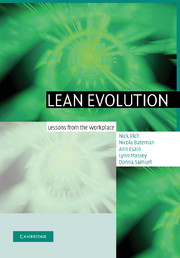Book contents
- Frontmatter
- Contents
- List of boxes
- List of figures
- List of tables
- Glossary
- 1 Introduction
- 2 Understanding the lean journey
- 3 Understanding your organisation
- 4 Laying the foundation stone of CANDO
- 5 Visual management and performance measurement
- 6 Problem solving, TQM and Six Sigma
- 7 Pull systems
- 8 Total productive manufacturing (TPM)
- 9 Sustainability
- 10 Group learning
- 11 Reflections and future challenges
- References
- Index
4 - Laying the foundation stone of CANDO
Published online by Cambridge University Press: 17 August 2009
- Frontmatter
- Contents
- List of boxes
- List of figures
- List of tables
- Glossary
- 1 Introduction
- 2 Understanding the lean journey
- 3 Understanding your organisation
- 4 Laying the foundation stone of CANDO
- 5 Visual management and performance measurement
- 6 Problem solving, TQM and Six Sigma
- 7 Pull systems
- 8 Total productive manufacturing (TPM)
- 9 Sustainability
- 10 Group learning
- 11 Reflections and future challenges
- References
- Index
Summary
Getting started
The first stage in the ‘hands-on’ element of the lean journey is to orientate people's thoughts and interest through awareness raising and promotional activities. The purpose of awareness-raising seminars is to provide key personnel with knowledge of what to expect from CANDO activities and to understand why these activities take place. The seminars consist of an outline of the principles of lean, a business game to illustrate lean principles and a review of CANDO activities. The lean business approach looks to change the system, but also to drive the change with the workforce by including them in the decision-making and change process. As a result, it is important that the whole organisation is aware of the lean business approach, and gradually the training in the application of lean principles will cascade down throughout the organisation and out into the supply chain (Dimancescu et al., 1996).
CANDO is the most common starting point for the beginning of all change aimed at creating a lean production organisation and commences with the promotion of visible change within the workplace. Years of failed initiatives have resulted from good ideas that had little in them for those that were the subjects of the changes – the shop-floor teams. To create a positive management–employee relationship requires a clear signal from management that they are seriously focusing on lean as a business approach and not as a short-term initiative.
- Type
- Chapter
- Information
- Lean EvolutionLessons from the Workplace, pp. 60 - 79Publisher: Cambridge University PressPrint publication year: 2006



